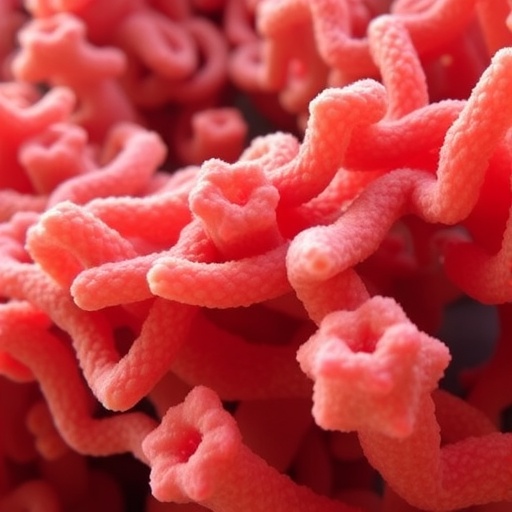
In a groundbreaking study, researchers have unveiled the purification and characterization of a highly thermostable metalloprotease derived from the bacterium Geobacillus thermoleovorans HBB208. The findings, published in the International Microbiology journal, spotlight the potential of this enzyme in industrial applications, particularly those requiring high-temperature processes. The significance of this research lies not only in the enzyme’s stability at elevated temperatures but also in its molecular characteristics that hint at wide-ranging functionalities in biocatalysis.
Geobacillus thermoleovorans, an extremophile bacterium known for thriving in high-temperature environments, has become a focal point for biotechnological advancements. The robust nature of this organism allows it to produce enzymes that not only survive but thrive under conditions that would denature most enzymatic proteins. The isolation and characterization of its metalloprotease opens doors to various industrial applications, including food processing, waste treatment, and bioremediation.
In the quest to isolate the thermostable metalloprotease, researchers employed a series of purification techniques. These included ammonium sulfate precipitation, ion-exchange chromatography, and gel filtration, each playing a vital role in achieving high enzyme purity. The meticulous process culminated in the identification of a protease exhibiting significant thermal stability, retaining over 80% of its activity at temperatures exceeding 70 degrees Celsius. This level of stability not only sets it apart from other proteases but also significantly broadens its applicability in harsh industrial settings.
The researchers delved into the biochemical properties of the purified metalloprotease, assessing its pH and temperature optima. It was observed that the enzyme exhibits maximum activity around neutral pH levels, making it compatible with various physiological environments. The temperature profile further highlighted its unique characteristics, as the enzyme remained active across a broad temperature range, showcasing its potential to operate efficiently under conditions typically encountered in industrial processes.
Structural analysis revealed that the metalloprotease presents a distinctive fold that is critical for its function and stability. The presence of metal ions appears pivotal in maintaining the structural integrity of the enzyme, providing insights into its catalytic mechanism. These findings suggest that the metalloprotease’s activity might be enhanced in the presence of specific metal co-factors, aligning with its classification as a metalloprotease.
The implications of this research extend beyond mere characterizations of the enzyme. Given the pivotal role that proteases play in numerous biological processes, the discovery of a highly thermostable variant opens avenues for innovative applications. Industries looking to enhance their processes, particularly those reliant on enzymatic reactions under extreme conditions, can benefit significantly from incorporating this protease into their workflows.
In food processing, for instance, the use of thermostable enzymes can improve the efficiency of protein modification, leading to better flavors, textures, and higher yields. Furthermore, in the pharmaceutical sector, the ability to function under high temperatures could enable more robust manufacturing processes for biopharmaceuticals. The potential for application in bioremediation, particularly in tough environmental conditions, could aid in the breakdown of complex pollutants, showcasing the enzyme’s versatility.
As industries increasingly push for sustainable practices, the enzymatic processes that utilize thermostable proteases could reduce the need for harsh chemicals and extreme processing conditions, thereby lowering energy consumption and minimizing environmental footprints. The relevance of this research in the context of sustainable industrial practices cannot be overstated, as enzymes serve as green catalysts that facilitate reactions with higher efficiency and specificity compared to traditional methodologies.
Moreover, the exploration of Geobacillus thermoleovorans metalloprotease may lead to a broader understanding of similar enzymes in other extremophilic organisms. The evolutionary adaptability observed in such extremophiles offers insights into enzyme design and engineering that can inspire future enhancements in biocatalysis. Each discovery furthers our knowledge of nature’s solutions to challenging industrial hurdles, encouraging more research in this domain.
The authors of the study, S. Karaman and K. Metin, have placed a strong emphasis on the necessity for ongoing research into extremophilic enzymes. They believe that the insights gained from Geobacillus thermoleovorans could lay the groundwork for a new era of biocatalysts that are not only effective but also tuned for the diverse industrial challenges faced today.
This research exemplifies the convergence of microbiology, enzymology, and industrial technology, illustrating the potential for interdisciplinary collaboration to yield practical solutions. The journey of understanding microbial life in extreme conditions not only uncovers valuable biotechnological tools but also enhances our appreciation for the complexity and adaptability of life.
With the publication of this study, the scientific community is poised to take a deeper look into the potential applications of thermostable metalloproteases. As more researchers harness the power of extremophiles, we can anticipate a surge of innovations that will benefit multiple sectors and promote sustainable practices globally. The future of industrial biotechnology looks promising, with enzymes like the one characterized in this study at the forefront of the transformation.
In conclusion, the work conducted by Karaman and Metin highlights the importance of extremophiles in producing robust enzymes that can revolutionize industrial processes. The meticulous isolation and characterization of the metalloprotease from Geobacillus thermoleovorans HBB208 serves as a testament to the remarkable possibilities that exist in the world of enzymes, opening doors for applications that could redefine efficiency in many fields, from food processing to waste management.
Subject of Research: Metalloprotease from Geobacillus thermoleovorans
Article Title: Purification and characterization of an extremely thermostable metalloprotease from Geobacillus thermoleovorans HBB208.
Article References:
Karaman, S., Meti̇n, K. Purification and characterization of an extremely thermostable metalloprotease from Geobacillus thermoleovorans HBB208. Int Microbiol (2025). https://doi.org/10.1007/s10123-025-00710-2
Image Credits: AI Generated
DOI: https://doi.org/10.1007/s10123-025-00710-2
Keywords: Thermostable metalloprotease, Geobacillus thermoleovorans, enzyme purification, industrial applications, biocatalysis.
Tags: bioremediation technologiesbiotechnological advancements in enzymologyenzyme characterization methodsenzyme purification techniquesenzyme stability at elevated temperaturesextremophile bacteria researchfood processing enzymesGeobacillus thermoleovoranshigh-temperature biocatalysisindustrial enzyme applicationsthermostable metalloproteasewaste treatment biocatalysts



